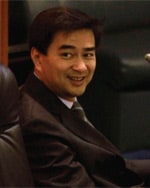NEWSMAKERS: THAILAND/CAMBODIA
By Thomas Clouse
 |
|
Thai PM, Abhisit Vejjajiva |
The Association of Southeast Asian Nations (Asean) passed a crucial test last month after fighting that had erupted along a disputed border between Thailand and Cambodia resulted in at least eight deaths and the displacement of thousands of families. The dispute stems from conflicting claims to land along the two countries’ shared border and near an ancient temple called Preah Vihear. In 1962, the International Court of Justice ruled that the temple belonged to Cambodia but was less clear about the land surrounding the temple. A 2008 decision by Unesco to recognize Preah Vihear as a World Heritage Site reignited the dispute and led to several border clashes in the two-and-a-half years since. Asean stepped in to mediate in the dispute and was able to negotiate an unofficial ceasefire that represents a milestone for the regional organization. Recently, Asean has been accused of adopting too low a profile and of failing to use its influence to resolve tensions across the Southeast Asia region.
The dispute had stoked nationalistic fervor and grown into an important domestic issue in both countries. In Bangkok members of the “yellow shirt” political faction staged protests calling on the government to be more forthright in its territorial disputes with Cambodia. The yellow shirts helped Thailand’s prime minister Abhisit Vejjajiva to gain power but have recently expressed disappointment with his leadership.
Although the Asean-mediated ceasefire has reduced the immediate threat of escalation, Joshua Kurlantzick of the Council on Foreign Relations,a Washington, DC–based think tank, says the fallout from the dispute suggests Abhisit is losing control of the Thai military. He says: “The military men taking action along the border often seem to be doing so without informing Abhisit or informing his office after the fact.” Some analysts believe the situation could set the stage for a coup.
In stark contrast,Cambodia’s prime minister Hun Sen has used the dispute to unite his country. Hun Sen also called for international assistance in resolving the dispute. In response, the United Nations Security Council called on the two nations to agree to a permanent ceasefire,although the UN did not offer any assistance in enforcing a ceasefire.



